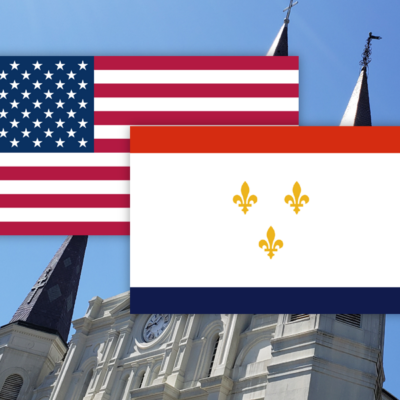New Orleans History is American History

New Orleans is a city with a rich and unique history that has played an important role in shaping American history. Founded in 1718 by the French, New Orleans was later ruled by the Spanish, and then became a part of the United States with the Louisiana Purchase in 1803.
The Purchase happened because President Thomas Jefferson understood the importance of having such a strategic stronghold.
The Purchase doubled the size of the new country. The territory stretched from today’s Minnesota all the way to the Gulf of Mexico. Almost immediately after the deal the British tried to snatch it.
A Dumb War
We were caught up in a dumb war with England called the War of 1812 – the first battle was in 1811, anyway … We were losing the war. We got crushed in Michigan. We tried to invade Canada – that was a bad idea. Then the Brits landed in Washington DC and burned most of the city – including the White House. We were down two touchdowns in the fourth quarter when along comes Andrew Jackson.
As the General of the Tennessee Militia he went to the president and told him the Redcoats were certainly coming to New Orleans, and James Madison basically told him “Can’t help you dude.”
So on his own, Jackson brought down Kentucky and Tennessee troops. He got here and united the French Creoles, the Americans, the free people of color, the Native Americans and even the pirates came aboard. On the final day of a month-long campaign, about 2800 ragtag Americans crouched behind a questionably sturdy rampart.
The British lined up anywhere from 8000 to 13000 men, depending whom you believe and marched toward the line. At the end of the day, the Redcoats lost 3000 men and the Americans lost 13. That’s how you get your picture on a $20 bill.
After the Battle of New Orleans more Americans poured in from upriver. A New Orleans plantation owner figured out how to granulate sugar which was great because granulated sugar doesn’t go bad. Soon we were one of the richest cities in America, number two though we were sixth in population. Then the Civil War broke out.
We were taken without a shot by the Yankee Navy and were blockaded so the British couldn’t help us. The only not-so-bad news is we started putting chicory – the bitter root of an endive plant – to extend our precious coffee supplies. Remember this was French here – we didn’t do that tea thing – we did coffee. Today, chicory coffee is a revered tradition.
You can learn more about French Quarter History on our Local’s Guide to the French Quarter Tour.
New Orleans is America’s Port
New Orleans still is an important port city, serving as a gateway to the Mississippi River and the Gulf of Mexico, which makes it a hub for trade and commerce. It is the link to over thirty major inland hubs including Chicago, Dallas, Memphis and Canada. To this day, New Orleans is the link for the central United States to the world.
It is also a center of cultural exchange, with a diverse population that included Native Americans, Europeans, Africans, Isleños, Southeast Asians, Latin Americans and a rainbow of people of mixed heritage. Our annual Mardi Gras and Jazz and Heritage Festival are world-renowned events that capture the local diversity.
The impact of New Orleans upon popular music cannot be overstated. Because Creole slave owners allowed their enslaved Africans to gather on Sundays and celebrate their own folkways, music that blended European stylings with African beats created jazz. Other musical forms: boogie woogie, ragtime, early rock and roll all have roots in New Orleans.
Additionally the cuisine in New Orleans draws from its diverse history and offers the world unique dishes that are copied world-wide. (Though it’s never as good as our mamas’!) Because of our kitchen heritage you will find crayfish, gumbo, blackened fish and other delicacies on tables everywhere.
When World War II raged in Europe, a New Orleans foundry run by Andrew Higgins invented a crucial weapon – the Higgins Boat. This personnel transport is the iconic boat that landed at the beaches of D-Day with their front prows dropping down as US soldiers poured out to begin the European invasion. Today the National World War II Museum is an expansive look at the war, documenting every facet of the war – including contributions from Germany and Japan as well.
While you’re there, You can learn more about our Garden District on our Glamorous Garden District Tour.
And Beyond..
Besides historic and cultural markers, New Orleans is the first choice for many important American events – we’ve hosted presidential conventions several times for both major parties; one of the largest annual Pride celebrations happens here; we’ve presented as many Super Bowls as any other city and often we are the home of the NCAA Final Fours – men’s and women’s.
Today, New Orleans remains a vibrant and unique city, with a rich cultural heritage that continues to influence American society. Because of our unique development – not British, but French/Spanish, the character of the city just feels different. When visitors arrive it’s like traveling the world without needing a passport.
And if you’re really intellectually adventurous, you can learn some wild stuff on our Pestilence, Pandemic & Plague Tour.
